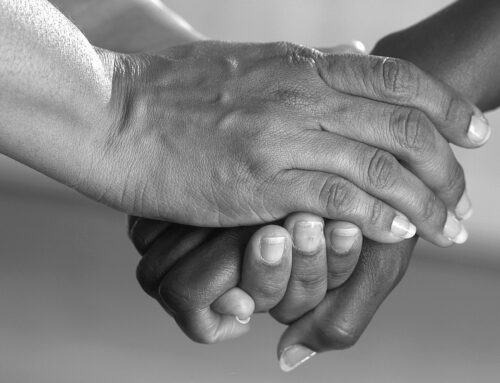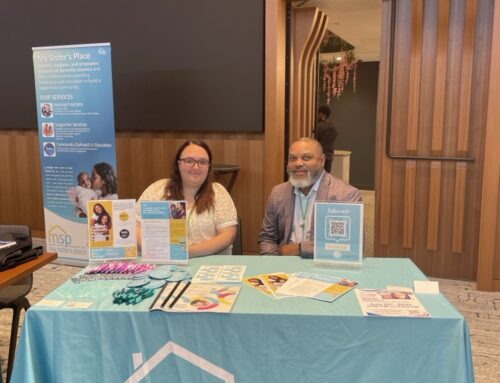Self-Care for Survivors and those who've experienced Domestic Violence
At My Sister's Place (MSP), we understand the profound impact self-care can have on the healing process, particularly for those who have experienced domestic violence. Through our work, we have witnessed firsthand how self-care routines can heal, recasting a deeply personal journey of trauma into one of also hope and resilience.
In this article, we share an inspiring story from one of our donors that highlights the importance of self-care. This story, along with the practical tips and resources we provide, is a testament to the resilience of survivors and MSP's belief that self-care should become a necessity and not be viewed as an indulgence. Self-care routines can very well save someone's life.
Donor Story
"For many years, during the lowest points of my fight for freedom from domestic abuse, I clutched onto anything that could provide me even the slightest amount of comfort".
"During her darkest times,"—a donor remarked in a note to MSP explaining how she found solace in a handmade crocheted blanket, "this blanket became her lifeline—a source of warmth and familiarity amid the chaos of abuse." Their note continued,
"I craved any ounce of protection while I was completely stripped of my own. I would curl up into the tightest ball in the far-back corner of my closet, with the door shut, lights off, rocking back and forth, praying for a life of safety and peace. And one thing I carried with me throughout all these seasons of abuse, turmoil, and uprooting was a pink and beige blanket that I crocheted a few years back. I would drape that blanket over my shoulders, entangling my fingers in the tiny holes and wrapping myself in a cocoon of familiarity underneath the unchanging piece of material. It grounded me.
I was lucky. I made it through. I survived the most violent attacks from my abuser. But the fight to survive the following days? That pain and devastation overpowered every fragment of my world.
But, when I cloaked myself in the blanket that I handmade with tenderness and care, it's almost as if I absorbed some of that warmth even if just for a moment.
That is why I want to donate handmade crocheted blankets to My Sister's Place. I so passionately want to provide a sliver of love and comfort to those who are simply trying to survive through the most devastating times of their lives."
While this donation was gifted to us years ago, we still remember this story as a testament to what self-care may look like both during an abusive relationship and after an abusive relationship.
What does Self-Care mean?
Self-care is a deeply personal journey, unique to each individual. While methods may vary, the core remains constant. Self-care is: nurturing your physical, mental, emotional, and spiritual needs to foster your own well-being and health.
Self-Care doesn't have to be complicated or involve professionals. For those experiencing domestic violence, self-care might simply mean taking five minutes to breathe deeply and center yourself. It could be about tackling a small task around the house that's been weighing on you or reaching out to a friend you haven't spoken to in a while. It may also look like the donor's story, finding something sentimental and grounding yourself in the moment, reminding yourself there's still warmth and there's familiarity.
When moving toward healing after trauma, self-care might also mean reaching out and offering a part of yourself to others. By extending kindness and compassion—like making crotched blankets, you not only help someone else reclaim their sense of self, but you also nurture your own healing journey in the process.
These intentional acts of care are just as important and meaningful as anything more structured. Self-care is about doing what you can, when you can, to nurture your well-being.
Meeting Basic Needs
Meeting basic needs is not just important—it is life-changing. For individuals facing health challenges alongside the trauma of abuse, access to essentials like food, shelter, and medical care is crucial. While we will emphasize self-care in other ways, ensuring these basic needs are met is the first step!
Statistics underscore this necessity:
-approximately 50% of women experiencing intimate partner violence (IPV) also suffer from chronic health conditions
-over 60% report symptoms of depression or anxiety, according to the CDC.
-additionally, research shows that survivors and those who have experienced domestic violence are four times more likely to develop mental health disorders, emphasizing the critical role that basic needs, and accessibility to basic needs, play in someone's recovery.
Meeting fundamental needs like shelter, clothing, food, and emotional support forms the bedrock of healing and empowerment. These essentials not only provide immediate stability but also pave the way for breaking free from cycles of abuse and neglect. Understanding the profound connection between abuse and mental health challenges highlights the importance of these basic needs in fostering a sense of safety and stability.
Whether built through personal efforts or with the help of supportive programs, this strong foundation is crucial for starting the journey toward reclaiming control and rebuilding one's life.
Self-Care Practices: Grounding Exercises and more
Grounding exercises can be a gentle yet practical addition to your self-care routine. When you're feeling overwhelmed and everything seems bleak or isolating, it's normal to feel unsure about your next steps. Simple practices, such as controlled breathing, can help you find a sense of stability and calm. These techniques are especially useful when confronting situations that once stirred strong emotions, helping you respond with more clarity and self-compassion. By incorporating grounding exercises, you create a space for yourself to reconnect and navigate your feelings with greater ease.
*However, it's important to remember that not every exercise works for everyone. Finding what helps you best manage the effects of trauma and anxiety might take time and experimentation. If controlled breathing Isn't effective for you, that's okay—there are many different strategies to explore.*
Here are a few resources offering grounding exercises and more:
- Crisis & Trauma Resource Institute, Stress Reduction Exercises Stress Reduction Exercises – Crisis & Trauma Resource Institute (ctrinstitute.com)
- This resource provides recordings of guided exercises for managing stress and anxiety through mindful awareness, breathing, and simple movements. It also provides a youth-guided breathing exercise.
- Blue Knot Foundation, National Centre of Excellence for Complex Trauma, Survivor Self Care (blueknot.org.au) (See Survivors, Survivor Self-care). Blue Knot delves into mindfulness, the significance of repetitive movements, and strategies to overcome the 'freeze' response to stress, offering a beginner's guide to stress relief.
- The Hotline provides a comprehensive guide on self-care for trauma survivors: 5 Powerful Self-Care Tips for Abuse and Trauma Survivors. They discuss positive affirmations, healing the mind through the body, breath work, channeling your pain into creativity, and asking for help.
Why is Self-Care important for Survivors?
For survivors, a consistent self-care routine is not just a beneficial practice—it's a crucial component of navigating the complex journey of survival and healing. Self-care strategies, such as controlled breathing, can be essential in helping regain a sense of control and calm during challenging times.
Controlled breathing is a powerful self-care tool. It helps to activate the parasympathetic nervous system, which counters the body's stress response. By focusing on your breath, you can slow down your physiological stress reactions, giving yourself precious moments to evaluate and manage your situation more effectively. This practice can enhance your ability to approach stressful situations with greater clarity and thoughtfulness, rather than reacting impulsively.
Self-care is therefore integral not only for managing immediate stress but also for reinforcing personal safety and well-being. Meeting fundamental needs—like shelter, food, and support—combined with practices like controlled breathing, provides a solid foundation for self-protection and empowerment.
Moreover, research underscores the critical importance of self-care for those experiencing domestic violence, as danger is often a persistent aspect of their lives. Studies reveal that factors such as a partner's mental health issues, substance abuse, and the survivor's own mental health challenges are strongly associated with increased risks of severe or lethal violence. For instance, survivors who are involved in relationships with partners exhibiting high levels of control or substance use face a significantly higher risk of experiencing severe violence. Learning and practicing self-care techniques, including effective response strategies, can be a vital aspect of managing this heightened risk and reinforcing one's personal safety.
Incorporating self-care into your daily routine can empower you to handle moments of crisis with greater resilience, ultimately supporting your journey towards safety and healing.
As well, we understand that self-care can be challenging to navigate on your own, and we are here to offer professional support for survivors in the Washington DC area. Below, you'll find resources and assistance to help you on your journey.
Embracing the Healing Journey
Healing looks different for everyone and isn't always linear—sometimes, it can feel like a roller coaster with ups and downs, or even one step forward and two steps back. Progress may be gradual, and that's okay. Self-care is a powerful way to start or strengthen your journey, regardless of your pace.
Remember, healing is a marathon, not a sprint. If you're on this journey, we recommend being patient with yourself. Keep showing up for yourself with the compassion you would offer a loved one. Give yourself the grace to heal in your own time, honoring your unique path.
Navigating Mental Health Barriers When Healing
Survivors of domestic violence often experience mental health barriers at higher rates. The trauma caused by control, fear and terror in abusive relationship can linger long after it ends. This may lead to avoiding activities that once brought joy, withdrawing from others, neglecting personal well-being, and feeling disconnected from passions. These patterns often stem from a diminished sense of self-worth, creating a harmful cycle that deepens mental health struggles.
Recognizing these behavior patterns is the first step toward lessening the impact of trauma and safeguarding against further harm. Understanding that these challenges may stem from mental health barriers can make reclaiming strength feel more attainable. Exploring new self-care practices can be both empowering and lifesaving, whether in the before, during or after an abusive experience. In this way, self-care becomes a form of resistance.
Seeking Professional Help
Seeking professional help can be immensely helpful in creating and pursuing a self-care plan. Studies have found, women seeking help through programming and services are 50% less likely to experience further violence. In the District of Columbia, there are various resources offering free mental health support for those who are experiencing or have experienced gender-based violence.
-DC Safe, 24/7 Help Line: 8004075048
-The Wendt Center for Loss and Healing offers mental health services, including individual and group therapy. They focus on trauma recovery. Contact: 2026240010
-House of Ruth offers free mental health counseling, support groups, and trauma-informed care. Contact: 2026677001
-DC Rape Crisis Center offers individual therapy, support groups, and crisis intervention. Contact: (24/7 Hotline) 2023337273
-Domestic Violence Intake Centers (DVIC) offer mental health services, often in partnership with local organizations. (note: in DC this is the same as DC SAFE`
-DC Victim Hotline 1-844-443-5732
My Sister's Place: Empowering Survivors and Supporting Mental Health
At My Sister's Place (MSP), we understand the importance of holistic support for survivors of domestic violence. Through our comprehensive programs and services, including counseling, advocacy, and shelter assistance, we empower individuals to rebuild their lives and thrive after experiencing trauma. Additionally, MSP offers training, case consultation, and advocacy to engage communities in preventing violence and abuse.
If you or someone you know has been in an abusive relationship in the past, it's important to know that there are resources and support available. The DC Coalition Against Domestic Violence has compiled a list of service providers in the DC area that offer a range of services including counseling, health support, and other assistance that survivors may need. For additional resources, please call the DC Victim Hotline at 1-844-443-5732.
For anyone who would like to support our work in empowering survivors of domestic violence in D.C., you may donate to My Sister's Place, sign up to volunteer, or email us about setting up domestic violence training in your community. Help us end the cycle of domestic violence and empower everyone to build healthy lives and relationships.





